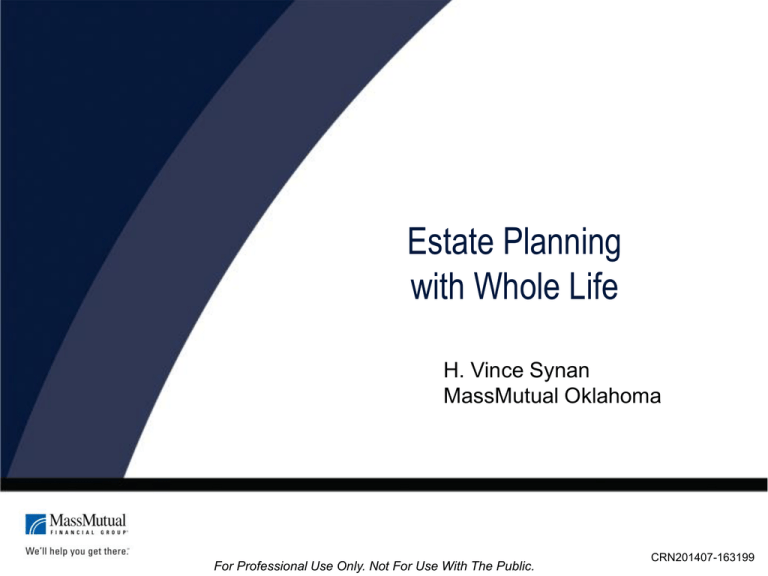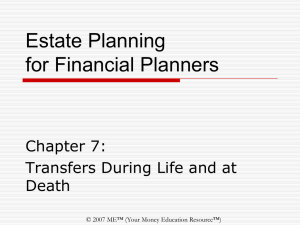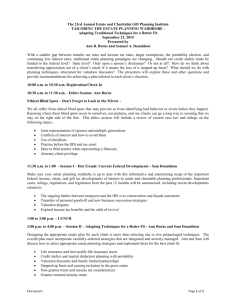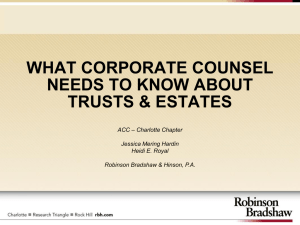
Estate Planning
with Whole Life
H. Vince Synan
MassMutual Oklahoma
For Professional Use Only. Not For Use With The Public.
CRN201407-163199
Disclaimer
The information provided is not written or intended as
specific tax or legal advice and may not be relied on
for purposes of avoiding any federal tax penalties.
MassMutual, its employees and representatives are not
authorized to give tax or legal advice. Individuals are
encouraged to seek advice from their own tax or legal
counsel.
Individuals involved in the estate planning process
should work with an estate planning team, including
their own personal legal or tax counsel.
2
Main Topics of the Day:
New Tax Changes
Future Tax Reform
New Estate Planning
Opportunities
3
Copyright AALU 2012 All Rights Reserved
Gifting and Estate Tax Basics – ATRA 2012
“Permanent” change to 40% tax rate, Exemption $5 million, indexed from 2010
Gift, Estate and
Generation Skipping**
Calendar Year
Tax Exemption
Tax Rate
2009
$3.5 million
45%
2010
$5 million
35%
2011
$5 million
35%
2012
$5.12 million
35%
2013
$5.25 million
40%
2014
$5.34 million
40%
Future years
$5.34 million + Inflation Adjustment
Annual Gift Tax Exclusions (2013/2014):
$14,000***
Portability made permanent
** ATRA 2012 provides for indexing of Gift, Estate and GSTT exemptions
*** indexed for inflation
4
2013 Federal Estate Tax, Gift Tax, and select rates
Initial Exemption Amount: $5,000,000
Assumed CPI:
3.00%
An example of
the net effect of
inflation on a
$5,000,000 ,
growing
exemption…
Year
Calendar
Year
2011
2012
2013
Rounded*
Growth in Husband and Growth in
Exemption Single Annual Wife Total Joint Annual
Amount
Exemption
Exemption Exemption
5,000,000
10,000,000
5,120,000
120,000
10,240,000
240,000
5,250,000
130,000
10,500,000
260,000
1
2014
5,340,000
90,000
10,680,000
180,000
2
2015
5,500,000
160,000
11,000,000
320,000
3
4
5
6
2016
2017
2018
2019
5,670,000
5,840,000
6,020,000
6,200,000
170,000
170,000
180,000
180,000
11,340,000
11,680,000
12,040,000
12,400,000
340,000
340,000
360,000
360,000
7
2020
6,390,000
190,000
12,780,000
380,000
8
9
10
11
2021
2022
2023
2024
6,580,000
6,780,000
6,980,000
7,190,000
190,000
200,000
200,000
210,000
13,160,000
13,560,000
13,960,000
14,380,000
380,000
400,000
400,000
420,000
12
2025
7,410,000
220,000
14,820,000
440,000
13
14
15
2026
2027
2028
7,630,000
7,860,000
8,100,000
220,000
230,000
240,000
15,260,000
15,720,000
16,200,000
440,000
460,000
480,000
For Professional Use Only. Not For Use With The Public.
5
The Impact of a Growing Exemption on a Growing Estate
Current Year Value:
Net Growth Rate, Years 1-10:
Net Growth Rate, Years 11+:
Marginal Federal Estate Tax Rate:
Cal
Year Yr.
(after tax)
(after tax)
(not including State)
Value
Balance
Beg. Yr.
Earnings
at 10%
In Estate Value
Your
Business
Interest
Business
Value at
Year End
Federal Estate
Estate Transfer Value
Amount
Your IRS
Your Heirs'
Exempted from
Partner's
Business
Federal Tax Business Interest
Interest
Total Spousal
Federal Estate
Net to
Amount that is Tax Due in Cash
Heirs
Exempt from Tax
in 9 months
After Tax
$1,771,470
$19,486,170
$7,000,000
$4,994,468
$14,491,702
19,683,000
1,968,300
21,651,300
7,000,000
5,860,520
15,790,780
21,870,000
2,187,000
24,057,000
0
9,622,800
14,434,200
24,300,000
2,430,000
26,730,000
10,240,000
6,596,000
20,134,000
27,000,000
2,700,000
29,700,000
10,500,000
7,680,000
22,020,000
Historical Growth
The impact
of the
federal
lifetime
exemption
on a
growing
estate
$30,000,000
10.00%
6.00%
40.00%
$17,714,700
2014
1
30,000,000
3,000,000
33,000,000
10,680,000
8,928,000
24,072,000
2015
2
33,000,000
3,300,000
36,300,000
11,000,000
10,120,000
26,180,000
2016
3
36,300,000
3,630,000
39,930,000
11,340,000
11,436,000
28,494,000
2017
4
39,930,000
3,993,000
43,923,000
11,680,000
12,897,200
31,025,800
2018
5
43,923,000
4,392,300
48,315,300
12,040,000
14,510,120
33,805,180
2019
6
48,315,300
4,831,530
53,146,830
12,400,000
16,298,732
36,848,098
2020
7
53,146,830
5,314,683
58,461,513
12,780,000
18,272,605
40,188,908
2021
8
58,461,513
5,846,151
64,307,664
13,160,000
20,459,066
43,848,599
2022
9
64,307,664
6,430,766
70,738,431
13,560,000
22,871,372
47,867,058
2023 10 $70,738,431
$7,073,843
$77,812,274
$13,960,000
$25,540,910
$52,271,364
2009
2010
2011
2012
2013
For Professional Use Only. Not For Use With The Public.
6
Income Taxes – ATRA 2012
Retention of lower income tax brackets for taxpayers under certain
income thresholds:
o Extension of lower tax brackets (10, 25%, 28%, 33% and 35%)
o Extension of 15% (and lower) capital gains and dividend rates
(qualified dividends only) for taxpayers with income at or below:
o Thresholds:
$400,000 - single filers
$425,000 – head of household
$450,000 – married filing jointly
o Above threshold income:
Ordinary income tax rates of 39.6%
Dividends and capital gains, taxed at 20%
7
Patient Protection and Affordable Care Act – 2013 Change
Medicare Tax Extended to “Unearned Income” in 2013
3.8% surtax on unearned income
o
o
o
o
Interest
o Passive income
Dividends
o Rental income
Capital Gains
Annuity payments - taxable distributions from non-qualified annuities,
and annuitized payments from a life insurance or endowment contract
(via a settlement option)
Applies to Modified Adjusted Gross Income (MAGI) above:
o $200,000 (Single)
o $250,000 (Married filing joint)
o $11,950 (Estates and Trusts)
Applies to lesser of :
o Net investment income
o Total income over threshold
Not indexed for inflation
8
Medicare Tax Expanded
“Unearned Income”
Yes
Interest/Dividends
X
Capital gains
X
Rental and Passive income
X
Annuity “income”
X
No
Tax-exempt bonds
X
IRA/Qualified Plan distributions
X
Sale of principal residence
X*
Sale of vacation residence
X
Life Insurance death benefits, loans and
non-taxable distributions
X
* In excess of Exclusion amount ($250,000/$500,000)
9
What’s Really Hot Right Now?: “Fiscal Cliff” continues
THE CONGRESSIONAL
AGENDA…
Remaining “Fiscal Cliff” issues
Sequestration –
It’s happening
Federal Deficit issues
Everyone wants “Tax Reform”
Issue: How to define?
Source: The Committee for a Responsible Federal Budget, available at:
http://crfb.org/sites/default/files/Between_a_Mountain_of_Debt_and_a_Fiscal_Cliff.pdf
10
Income Taxes in 112th / 113th Congress
TAX REFORM…What we know
“Tax expenditures” serve as most
significant source of revenue available
for reform ($1.1T annually)
Life insurance policy inside build-up
and death benefits – 12th largest tax
expenditure ($150 billion over five
years)
11
Copyright AALU 2012 All Rights Reserved
Select Tax Expenditures – “Cost” in Billions 2011-2015*
Mortgage interest deduction
Real Estate Taxes
Charitable contributions
State and local, sales, and personal property taxes
Exclusion of gain on sale of residence
Carry over basis on gifts
Step-up in basis at death
Reduced rates capital gains/dividends
Exclusion of Cafeteria benefits (IRC 125)
Employer medical benefits
Pension contributions and earnings
Municipal bond interest
Not taxing inside build-up life insurance
$464.1 billion
$117.1
$242.6
$230.3
$123.2
$ 26.6
$230.8
$456.6
$197.6
$725.0
$804.8
$177.6
$148.3
*Joint Committee on Taxation Estimates of Federal Tax Expenditures 2011-2015 (1/17/12)
Before passage of American Taxpayer Relief Act of 2012
12
Future Tax Reform: President’s Budget for Fiscal 2014
Additional changes to popular planning strategies
o Eliminating ability to create an irrevocable “grantor” trust not
includable in estate
o Eliminating discounts on transfers of non-business property
o Requiring a minimum 10% taxable gift on transfers into a GRAT
o Requiring that GRATs must last for a minimum of 10 years
13
2014 Planning Opportunities
Income Tax Planning
Closely monitor level of income - rate brackets, surtaxes, deduction
phase-outs
Deferred compensation planning – no impact on application of .90%
Medicare surtax
Client may want to consider changes to reduce impact of 3.8%
surtax
Consider whether to convert from flow-thru entity to C Corporation
o Especially if follow-thru on campaign promises to reduce corporate
income taxes
Lower corporate tax rate to 28%
Lower corporate rate on manufacturing to 25%
14
Planning for 3.8% Medicare Tax
Tax on investment income – dividends, interest, capital gains,
distributions from annuities, rental income, passive business income
Does not apply to retirement plan distributions (including IRAs) although
this income does impact modified adjusted gross income (MAGI) and
potential application of tax
Does not apply to tax exempt income
Does not apply to life insurance loans and non-taxable distributions
Applies to trusts
Early planning considerations:
o Did I mention Life Insurance?
o Non-taxable financial products may be more popular than before
o Dividend paying stocks less popular?
o Tax efficient investments (low turnover and low dividends)
o Tax deferred investments (annuities)
15
Estate and Gift Tax Issues
Clawback Issue now irrelevant
o Gifts made during 2011 or 2013 (utilizing $5 million+ exemption)
that are added back to estate, will not exceed estate tax exemption
amount at time of death (unless Estate Tax Exemptions Reduced
by a future Congressional action.)
Portability reduces need for Credit shelter or “by-pass” trust
o Property ownership between spouses no longer crucial
o Other considerations:
• Estate tax return required to be filed at death of first spouse
• Unused exemption not indexed for cost of living
• Generation skipping exemption not portable
• Growth out of estate if credit shelter trust funded
• No basis step up for assets in credit shelter trust
16
2014 Planning Opportunities
Estate Planning
o
o
o
o
Gifting/Generation Skipping planning remains vibrant for very wealthy
Leverage gifts with discounts
Leverage with low interest rate planning
Don’t forget about planning for State Estate and Inheritance Taxes
No Portability for state law purposes
o Use it or lose it – Some key planning techniques may be at risk
Life Insurance
o Greater opportunities to hold personally rather than need to use a trust
o Life insurance in Qualified Plans* may become more popular
Less concern that death benefit is includable in estate
Pay premiums with pre-tax dollars
Note participant is taxed each year on term value of death benefit protection
o In situations where premium is in excess of annual exclusions, consider a
part-gift, part-loan arrangement
*Due to the complexity involved in this process, producers need to be conversant with the appropriate tax regulations that
apply to these transactions and participants should consult with their tax adviser about the tax consequences associated
with the purchase of life insurance in a qualified plan and to determine the proper methodology to use in executing such a
17
plan.
Low Interest Rate Planning Opportunities
Applicable Federal Rates
Rate Comparison
Short-term AFR
Nov. 2007
4.11%
June 2013 March 2014
.18%
.28%
up to 3 year term loans & demand loans (see note below)
Mid-term AFR (3+ to 9 years)
Long-term AFR (9+ years)
4.39%
4.89%
.95%
2.44%
1.84%
3.36%
7520 Rate
5.20%
1.20%
2.20%
Demand Loans –
o Annual Demand Loan rate is published by the IRS each year. IRS calculates
rate by adding 50% of short-term January rate and 50% of short-term July
rate.
o For example, in 2012, the January rate was .19% and the July rate was .24%.
The average of .215% was rounded to .22%.
o Here are blended rates over past few years:
2014 - .22%
2010
2013 - .22%
2009
2012 - .22%
2008
2011 - .40%
2007
-
.59%
.82%
2.80%
4.92%
18
What’s Hot
Anything Other Than Taxes?
19
Trust Decanting
The next Big Thing??
As of 2012 18 states have adopted decanting legislation
New York was the first 1992
Virginia, Illinois 2012
Rev. Rul. 2011-101
Dorsh, Eric and Rashad Wareh. “Decanting: A Statutory Cornucopia.”
Trusts & Estates March 2012
20
Trust Decanting Statutes
Dorsh, Eric and Rashad Wareh. “Decanting: A Statutory Cornucopia.” Trusts & Estates March
2012
21
Analysis of Different Types of Life Policies in Irrevocable Trusts
Permanent Insurance Designs
For Irrevocable Trusts
22
Analysis of Different Types of Life Policies in Irrevocable Trusts
Points to Consider
Death benefits are obviously important in estate planning
Many believe that No-Lapse Guaranteed contracts
represent the least expensive permanent death benefit
Whole life policies, of course, do offer permanent death
benefits with guaranteed cash values and the opportunity
for dividends*
First, we’ll look at how do different types of whole life
policies compare?
*Non-guaranteed
23
For Professional Use Only. Not For Use With The Public.
The Numbers – Illustrations assume
Four different types of whole life to review
Product
Design
Premium
Initial
Death
Benefit
10 Pay
$10,000
$209,512
Paid-Up Additions
Male Age 50, Select
Preferred Non-Tobacco
Paid up at 65
$10,000
$264,628
Paid-Up Additions
Male Age 50, Select
Preferred Non-Tobacco
20 Pay
$10,000
$304,322
Paid-Up Additions
Male Age 50, Select
Preferred Non-Tobacco
Paid up at 100
$10,000
$410,987
Paid-Up Additions
Male Age 50, Select
Preferred Non-Tobacco
Dividend
Option
Age, Gender &
Underwriting Class
24
For Professional Use Only. Not For Use With The Public.
Policy Cash Values* – Part I
Hypothetical Internal Rates of return on Cash Values, at various periods
IRR On
Cash:
Yr 1*
IRR On
Cash:
Yr 5*
IRR On
Cash:
Yr 10*
IRR On
Cash:
Yr 20*
IRR On
Cash:
Yr 30*
Product
Design
Annual
Premiums
Total
Premiums
Paid
10 Pay
$10,000
$100,000
-61.95%
-5.50%
1.09%
4.26%
4.79%
Paid up at
65
$10,000
$150,000
-94.07%
-8.73%
0.39%
3.99%
4.70%
20 Pay
$10,000
$200,000
-74.53%
-12.54%
-0.95%
3.35%
4.45%
Paid up at
100
$10,000
$500,000
-100%
-15.44%
-1.01 %
2.92%
4.04%
*These values are not guaranteed.
25
For Professional Use Only. Not For Use With The Public.
Policy Cash Values* – Part II
Hypothetical Cash Values as a percent of total premiums paid, at various periods
CSV % of
Total
Premiums in
Yr 1*
CSV % of
Total
Premiums
in Yr 5*
CSV % of
Total
Premiums
in Yr 10*
Product
Design
Annual
Premium
Total
Premiums
Paid
10 Pay
$10,000
$100,000
38.1%
84.7%
106.2%
Paid up at 65
$10,000
$150,000
5.9%
76.7%
102.1%
20 Pay
$10,000
$200,000
25.5%
68.1%
94.9%
Paid up at 100
$10,000
$500,000
0.0%
62.2%
94.6%
*These values are not guaranteed.
26
For Professional Use Only. Not For Use With The Public.
The Numbers
Example of a Single Life Guaranteed Universal Life
Product
Design
Hypothetical
single life
guaranteed UL
Premium
$10,000
Initial Death
Benefit
$826,169
Death Benefit
Option
Option 1
Age, Gender,
Underwriting
Class
Male Age 50,
Select Preferred
Non-Tobacco
27
For Professional Use Only. Not For Use With The Public.
Policy Death Benefit IRR: Whole Life and Guaranteed UL Insurance
28
NOTE: Current values are not guaranteed.
For Professional Use Only. Not For Use With The Public.
Why Whole Life vs. Guaranteed UL Inside Trust?
Key Aspects of Whole Life
Whole Life provides a source of funds available to trustee
Dividends (which are not guaranteed) can be used to help pay
policy premiums
o Trustee may have access to policy cash value to support the policy in
the event the grantor fails to make a timely gift to the trust
Dividends (which are not guaranteed) can be used to purchase
additional paid up life insurance
o Increasing policy death benefit provides a level of “inflation
protection” to trust beneficiaries
Policy cash values grow tax deferred
Distributions under the policy (including cash dividends and partial/full surrenders) are not subject to taxation up to
the amount paid into the policy (cost basis). If the policy is a Modified Endowment Contract, policy loans and/or
distributions are taxable to the extent of gain and are subject to a 10% tax penalty. Access to cash values through
borrowing or partial surrenders will reduce the policy’s cash value and death benefit, increase the chance the policy
will lapse, and may result in a tax liability if the policy terminates before the death of the insured.
29
For Professional Use Only. Not For Use With The Public.
Why Whole Life vs. Guaranteed UL Inside Trust?
Key Aspects of Guaranteed Universal Life
Generally provides greater initial guaranteed death benefit per
premium dollar, hence lower premium outlays.
These products generally have minimal or no cash value
available for the trustee in later years.
Failure to timely pay premium may void the death benefit
guarantee.
Unexpected accident or illness of trust grantor may create a
temporary hardship in making gifts to pay premium.
Guaranteed UL products provide a level benefit, so over time
inflation may erode the purchasing power of the death benefit.
30
For Professional Use Only. Not For Use With The Public.
Why Whole Life vs. Guaranteed UL Inside Trust?
Key Aspects of Guaranteed Universal Life
The long term impact of inflation
on a GUL death benefit
31
For Professional Use Only. Not For Use With The Public.
In Summary – The Importance of Cash Values in an ILIT
Distinct Advantages of Cash Value in an ILIT
Cash values can provide for distributions during life.
If significant cash values exist, disruption in gifted
amounts may be less problematic.
If the death benefit needs of the trust beneficiaries
change, cash values may be used to facilitate purchase
of more appropriate products.
32
For Professional Use Only. Not For Use With The Public.
Optional Design for Irrevocable Life Insurance Trusts
JSwl and JSulG
An optional life insurance design to consider is Joint and Survivor
whole life (JSwl) and Joint and Survivor universal life – both the
current assumption and the Guaranteed design (JSulG).
This product is also known as survivorship life insurance and
second to die life insurance. The product is designed to pay the
death benefit at the second death.
Although this product design is useful in many ways, the primary
use is in estate planning; often for the purpose of providing
liquidity for an executor to pay estate taxes and other final
expenses.
33
For Professional Use Only. Not For Use With The Public.
Assumption for JSwl and JSul/g – Death Benefits and Cash Values
Joint and Survivor WL compared to Joint and Survivor Guaranteed UL
Product
Design
Premium
Initial
Death
Benefit
Term Rider:
50% base, 50%
term blend
Total Death
Benefit
Dividend
Option
Age, Gender,
Underwriting
Class
JSwl
$257,330
$12,000,000
None
$12,000,000
Paid-Up
Additions
Male & Female
Age 60, Select
Preferred Non
Tobacco
JSwl with
Term Rider
$147,108
$6,000,000
$6,000,000
$12,000,000
Paid-Up
Additions
Male & Female
Age 60, Select
Preferred Non
Tobacco
JSulG
(guaranteed
UL)
$135,287
$12,000,000
None
$12,000,000
Death
Benefit
Option 1
Male & Female
Age 60, Select
Preferred Non
Tobacco
JSwl Example is a level-premium, second-to-die, participating, permanent life insurance policy.
JSulg Example is participating, interest sensitive, guaranteed joint and survivor universal life insurance.
34
For Professional Use Only. Not For Use With The Public.
Policy Values (both insureds are alive)*
$12 million Initial Death Benefit
JSwl
$257,330
Annual Premium:
Outlay
$1,286,650
2,573,300
3,859,950
6,433,250
9,006,550
$816,059
2,347,286
2,347,286
10,591,685
18,907,363
$12,067,765
12,432,285
13,449,483
17,462,640
23,618,735
5
10
15
Age 85
25
35
Cash
Surrender
Value
Age 85
5
10
15
25
35
Death
Benefit
5
10
15
Age 85
25
35
JSwl with term
blend **
$147,366
$735,541
1,471,082
2,206,624
3,677,706
5,148,788
$496,602
1,380,918
2,584,026
5,771,639
8,901,264
$12,000,000
12,000,000
12,000,000
12,000,000
12,000,000
JSulG
$120,059
$676,435
1,352,871
2,029,307
3,382,179
4,735,050
$79,736
340,772
344,149
0
0
$12,000,000
12,000,000
12,000,000
12,000,000
12,000,000
* These values are not guaranteed. They include dividends that are neither estimates nor guaranteed. Dividends in future years may be higher or lower
depending on the company’s experience.
35
** Values shown represent a 50/50 term blend.
For Professional Use Only. Not For Use With The Public.
Summary- Why cash value may matter in Estate Plans!
Cash Value in Joint and Survivor Life Insurance / ILIT Planning
Cash values can be used for lifetime distributions
o Distributions for spouse, children and others
Cash values can be used to exchange for another life contract
Cash values can be accessed to provide liquidity for purchase or to make loans
Assuming a couple each establishes a trust, the cash values can be used to help
provide supplemental retirement income from cash value with protection in
the event of death of either survivor. Reciprocation rules must be considered.
In States with questionable creditor protection, assets held in an irrevocable
trust can provide more certain protection from creditors
With whole life insurance any dividends (not guaranteed) can be used for
distribution, to reduce premiums or to purchase paid-up additions
36
For Professional Use Only. Not For Use With The Public.
What’s Hot
Synopsis of Grantor Trusts
37
The Grantor Trust Rules – A Hidden Planning Tool!
Grantor Trusts
Internal Revenue Code Section 671-679 collectively
are know as the “Grantor Trust Rules”. The Rules
operate to treat the Grantor as the owner of all trust
assets for income tax purposes.
Usually created by Transfer of assets to a trust while
retaining some rights on benefits –
· Retained interests (IRC Sec. 673)
· Power to Control Beneficial Enjoyment (IRC Sec. 674)
· Certain Administrative Powers (IRC Sec. 675)
38
For Professional Use Only. Not For Use With The Public.
The Grantor Trust Rules Continued
Grantor Trusts
The status as a “Grantor Trust” is independent from
estate tax inclusion.
Several retained rights will cause assets of trust to be
included within Grantor’s Taxable Estate –
· Power to Revoke (think living trusts)
· Retained significant interests (think income)
· Right to control beneficial enjoyment (think Power of
Appointment)
However, there are several retained powers that
typically do not cause trust assets to be included in
taxable estate.
39
For Professional Use Only. Not For Use With The Public.
Why are the Grantor Trust Rules So Important?
Grantor Trusts
Transactions between Grantor and his/her trust are
ignored for income tax purposes.
· Loans between Grantor and Trust - No taxable income
on interest (you can’t loan money to yourself!)
· Sales between Grantor and Trust - No gain on sale
Taxes on income generated by Grantor Trust are the
direct responsibility of Grantor and payment of taxes
(income) is not a gift.
Grantor Trust are allowable owners of “S” corp stock.
40
For Professional Use Only. Not For Use With The Public.
Benefits of an Irrevocable Trust
“Defective” Trusts
Facilitates gifting
Removes property from taxable estate of Donor and spouse
Provides creditor protection if properly drafted
o Creditors of both the Grantor and the trust beneficiaries
The appreciation of gifted assets is removed from the estate
Creates potential management efficiency
Control disposition of property for “protection” of beneficiaries
Not affected by ATRA, but this is an ongoing Congressional
revenue-raising target.
41
For Professional Use Only. Not For Use With The Public.
Benefits of an Irrevocable Trust – “Safety Valves”
“Defective” Trusts
Spouse of grantor can be a lifetime beneficiary
With an independent trustee, distributions can be discretionary
in favor of the spouse
Children can be lifetime beneficiaries
Grantor can hold power to remove and replace trustee*
Grantor can borrow from trust assets*
Grantor can swap assets with trust*
Grantor’s Spouse can hold a limited power of appointment
(except over a policy on spouse’s life)
Trust Protector or Special Trustee can be given power to amend
trust if in the best interests of the trust beneficiaries
* If trust instrument permits
42
For Professional Use Only. Not For Use With The Public.
Assets Replaced by Grantor
“Defective” Trusts - IRS Revenue Ruling 2011-28
Retained powers that will not typically cause inclusion of trust
assets in taxable estate
o Several administrative and income powers
o The power to substitute assets of value: Revenue Ruling 2011-28 –
Provided guidance that this power, even if trust assets include life
insurance, will not cause estate tax inclusion.
o Prior to this Ruling uncertainty existed
This is a useful power as it’s easy to draft into trust and applies
to entire trust (income and principal)
43
For Professional Use Only. Not For Use With The Public.
Grantor Trust: Example of Income Taxation
IRS
4
Individual Grantor
Payment of income taxes $35.00
(assume 35% tax rate).
3
Taxes Attributed by
Grantor Trust Rules
Irrevocable
Key Point: This payment
5
is not a taxable gift!
Grantor
Trust
2
$100 Cash
Assets generating $100
of ordinary income
on Trust assets
1
44
For Professional Use Only. Not For Use With The Public.
Low Interest Rate Planning Opportunities
Gift Loan Idea
45
Low Interest Rate Planning - Gift Loans
Loans to Trust (or Kids) to purchase assets from Donor/Lender
Loans to purchase life insurance
Arbitrage loans – Earnings can help pay life premiums
o Example: Grantor lends $10 million to irrevocable trust
o Trust pays interest of $197,000 annually for 9 years at 1.97% (Feb.)
o If trust earns 6% on its investments, that’s $600,000, resulting in net
annual cash flow to trust of $403,000
Over 9 years, $4.9 million of gift tax free cash flows into trust
Grantor pays any income taxes on trust’s investment earnings under
grantor trust rules
At end of loan term, loan could automatically renew for anther 9 year
period, but at current interest rate
Term could be longer (20, 30, 40 years) at Long Term Rate (3.56%)
o Important: Trust should contain “seed money” equal to 10% of amount
loaned to trust – this can be gifted prior to loan transaction
46
Low Interest Rate Planning Opportunities
Installment Sales to Grantor Trusts
& Grantor Retained Annuity Trusts
47
Installment Sale of Discounted Assets to Grantor ILIT
Installment Sale of Discounted Entity Assets to Irrevocable Grantor Trust
(Intentionally Defective Irrevocable Trust -”IDIT”)
Step 1: Trust should be “seeded” with gift of at least 10% of value of assets
involved in installment sale
o IRS will disregard sale arrangement if trust looks solely to assets sold as
the source to repay note and interest
Step 2: Grantor sells business interests to trust
o Sale price of minority interest eligible to be discounted
o Sale in exchange for promissory note for term of years
o Requires interest of at least AFR (Sec. 7872 rate)
Results:
o Under Grantor trust rules, no reportable gain on sale and no taxation on
trust interest payments
o Income generated on assets in trust taxable to Grantor
o Sale of Discounted Assets at Low Interest Rate may work as an effective
Estate Freeze technique
48
Grantor Retained Annuity Trusts (GRATs)
Interest leveraging estate planning technique
o GRATs are extremely beneficial in today’s low interest rate environment
o Grantor transfers assets to trust scheduled to last for a fixed term of years
o Trust will make payments to grantor of fixed (or increasing) annual
amount as set by terms of trust agreement
o Grantor’s retained interest is valued on date of transfer to trust using IRS
7520 interest rate
Retained value is subtracted from transferred value to determine amount of
taxable gift
o At termination of trust, remaining assets are distributed to remaindermen
– kids or preferably grantor’s ILIT
o This is an area where Congress has discussed making changes that could
make GRATs less appealing in future
49
Installment Sale v. GRAT
Issue
Installment Sale
GRAT
Interest Rate?
AFR (mid or long)
120% of mid-term
Payments?
Flexible – interest can be
accrued
Required
Taxable Gift?
Revaluation risk – higher
value would cause gift
Asset revaluation requires
higher annual payment
Gift tax Return?
No
Yes; small gift is generally
unavoidable
Pre-funding Trust?
Yes; seed money of at
least 10% required
No
Generation Skip?
Yes
-Balance in Estate
-Income issues uncertain
on remaining payments
-No step up in Basis
No; ETIP Rules
Client Dies before all
payments made?
Calculated portion of
GRAT includible in Estate
- Required payment
divided by current 7520 50
For Producer Use Only.
Not For
Use
With
The
For Professional
Use
Only.
Not
ForPublic.
Use With The Public.
Applicable Federal Rates – An Amazing Opportunity!
Low Interest Rates Matter
Applicable Federal Rates – Rates published monthly by
IRS to set minimum rates for:
Gift Loans – Parents to Child
Employment Loan – Employer to Employee
GRAT Valuation Calculations – IRC Sec. 7520 Rate used
to value annuity interest (120% of the mid-term rate)
51
For Professional Use Only. Not For Use With The Public.
Low Interest Rate Planning Opportunities
Part Gift, Part Loan
to Fund Life Insurance
in an ILIT
52
Personal Loans to Fund Life Insurance
Fred Fifty Case Example
Fred Fifty
Grantor/Insured
3
Trustee issues note
2
to Fred
Loans $25,000 each year
and gifts of $25,000 each
year to fund premium
ILIT for
ILIT purchases Paid Up at
age 65 whole life
$50,000 Annual Premium
Select Preferred Non
Tobacco
benefit of
wife and
1
Children *
* Trust must be seed funded with 10% of purchase price, or as much as is recommended by
client’s estate tax advisor.
For Professional Use Only. Not For Use With The Public.
53
Personal Loans to Fund Life Insurance Continued
Fred Fifty Case Example
Policy shown is a face amount of $1,292,702. The policy is a paid up at age 65
whole life on a 50 year old male, Select Preferred, Non-Tobacco with an annual
premium of $50,000.
Policy dividends at 50 basis points below current rate, and the adjustable loan
rate was set to +100 basis points (both conservative moves).
Comparison of cash values and loan for a 15-year premium payment period
using a rate of 4.00% (greater than the 3.36% March, 2014 AFR).
Loan is paid back over time to the Grantor - and any balance is paid off at
death. Optional spousal income/distribution benefits also shown after loan is
repaid.
*These values are not guaranteed. They include dividends that are neither estimates nor
guaranteed. Dividends in future years may be higher or lower depending on the company’s
experience. See full ledger for complete details. Estate planning strategies must be considered by
54
the client’s qualified tax and legal advisors.
For Professional Use Only. Not For Use With The Public.
Personal Loans to Fund Life Insurance Continued
Fred Fifty Case Example: Grantor Cash Flow and Balance Sheet
CASH FLOW
Loan Repay
Annual Gift
or Spouse
Life Time
To Pay
End of
Benefit from
Year Premiums or Exemption
Loan To Trust Policy Values
Gift
Repay Loan
Year Age
0
(25,000)
0
(25,000)
51
1
0
(25,000)
0
(25,000)
52
2
0
(25,000)
0
(25,000)
53
3
0
(25,000)
0
(25,000)
54
4
0
(25,000)
0
(25,000)
55
5
0
(25,000)
0
(25,000)
56
6
0
(25,000)
0
(25,000)
57
7
0
(25,000)
0
(25,000)
58
8
0
(25,000)
0
(25,000)
59
9
0
(25,000)
0
(25,000)
60
10
Tax on
Payment
from Trust
0
0
0
0
0
0
0
0
0
0
ASSETS
Loan Repayble Spousal Trust Trust Cash
Value
Distributions
By Trust @
in Excess of Available To
AFR of 4%
Total Donor
Loan Repay Repay Loan
End Of Year
Cash Flow
2,883
0
26,000
(50,000)
39,235
0
53,040
(50,000)
85,912
0
81,162
(50,000)
134,445
0
110,408
(50,000)
184,965
0
140,824
(50,000)
238,529
0
172,457
(50,000)
295,312
0
205,356
(50,000)
355,527
0
239,570
(50,000)
419,372
0
275,153
(50,000)
487,024
0
312,159
(50,000)
Trust Death
Benefit
Available To
Repay Loan
1,300,681
1,308,643
1,317,232
1,326,499
1,336,785
1,350,458
1,367,428
1,387,666
1,410,687
1,436,460
15
65
(25,000)
0
(25,000)
0
0
(50,000)
520,613
0
885,598
1,623,730
20
70
0
0
0
50,000
0
50,000
351,757
0
870,346
1,411,020
25
75
0
0
0
50,000
0
50,000
146,317
0
841,539
1,255,440
30
80
0
0
0
50,000
0
50,000
0
50,000
791,793
1,112,792
35
85
0
0
0
50,000
0
50,000
0
50,000
711,267
953,048
40
90
0
0
0
0
0
0
0
0
872,539
1,082,771
45
95
0
0
0
0
0
0
0
0
1,033,889
1,205,241
50
100
0
0
0
0
0
0
0
0
1,247,778
1,247,778
Totals:
(375,000)
(375,000)
1,000,000
0
250,000
For Professional Use Only. Not For Use With The Public.
397,736
55
Personal Loans to Fund Life Insurance Continued
Fred Fifty Case Example: Trust Cash Flow and Balance Sheet
Annual
Loan
(25,000)
(25,000)
(25,000)
(25,000)
(25,000)
(25,000)
(25,000)
(25,000)
(25,000)
(25,000)
ASSETS
LIABILITIES
Loan
Trust
Loan
Trust
Annual
Loan
Total
Repayed
Cash Value Payoff
Death
Interest
Reduced
Grantor
Annual
or Spouse
Less
Using
Benefit
Capitalized Through Loan With
Premium Distribution
Donor
Policy
Less Donor
or Due
Deemed
Interest
Payment from Policy
Loans
Values
Loans
at 4%
Gifts
Capitalized
(50,000)
0
(22,117)
0
1,274,681
(1,000)
0
(26,000)
(50,000)
0
14,235
0
1,255,603
(2,040)
0
(53,040)
(50,000)
0
60,912
0
1,236,070
(3,122)
0
(81,162)
(50,000)
0
109,445
0
1,216,091
(4,246)
0
(110,408)
(50,000)
0
159,965
0
1,195,961
(5,416)
0
(140,824)
(50,000)
0
213,529
0
1,178,001
(6,633)
0
(172,457)
(50,000)
0
270,312
0
1,162,072
(7,898)
0
(205,356)
(50,000)
0
330,527
0
1,148,096
(9,214)
0
(239,570)
(50,000)
0
394,372
0
1,135,535
(10,583)
0
(275,153)
(50,000)
0
462,024
0
1,124,301
(12,006)
0
(312,159)
CASH FLOW
Annual
And
End of Lifetime
Year
Donor
Year Age
Gifts
1
51
25,000
2
52
25,000
3
53
25,000
4
54
25,000
5
55
25,000
6
56
25,000
7
57
25,000
8
58
25,000
9
59
25,000
10
60
25,000
15
65
25,000
(25,000)
(50,000)
0
860,598
0
1,103,116
(20,024)
0
(520,613)
20
70
0
0
0
(50,000)
870,346
(50,000)
1,059,264
(15,529)
0
(351,757)
25
75
0
0
0
(50,000)
841,539
(50,000)
1,109,123
(7,628)
0
(146,317)
30
80
0
0
0
(50,000)
791,793
0
1,112,792
0
0
0
35
85
0
0
0
(50,000)
711,267
0
953,048
0
0
0
40
90
0
0
0
0
872,539
0
1,082,771
0
0
0
45
95
0
0
0
0
1,033,889
0
1,205,241
0
0
0
50
100
0
0
0
0
1,247,778
0
1,247,778
0
0
0
(375,000)
(750,000)
(1,000,000)
(303,354)
0
(7,208,859)
Totals: 375,000
(602,264)
For Professional Use Only. Not For Use With The Public.
56
Personal Loans to Fund Life Insurance Continued
Fred Fifty Case Summary
Result of using long-term AFR and split gifting/loaning of Premiums?
Strategy has accomplished:
Significant death benefit out of estate.
Repayment to Fred and his spouse for their loan by the Trustee
using tax free distributions from policy cash value.
Additional spousal income distributions as needed.
Because of Grantor Trust, no income tax consequences.
No gift tax implications unless loan is forgiven.
*These values are not guaranteed. They include dividends that are neither estimates nor
guaranteed. Dividends in future years may be higher or lower depending on the company’s
experience. See full ledger for complete details. Estate planning strategies must be considered by
the client’s qualified tax and legal advisors.
57
For Professional Use Only. Not For Use With The Public.
Personal Loan to Fund Life Insurance Conclusion
Fred Fifty Case Summary
At age 65:
Total loans of $375,000 and total gifts of $375,000.
Total loan owed back to Grantor of $501,783.
Trustee owns Net Cash Value of $860,598 after Loans.
Trustee owns Net Death Benefit of $1,103,116 after Loans.
At Age 90:
Loan repayment of over $602,000. Of this amount, loan interest of
$227,000 received was not taxable under grantor trust rules.
An additional optional spousal income benefit of over $397,000 was
received tax free utilizing a surrender to basis, then loan strategy.
Trust has remaining cash value of over $872,000.
Trust has remaining tax free death benefit of over $1,082,000.
58
For Professional Use Only. Not For Use With The Public.
Personal Loan to Fund Life Insurance Conclusion
Fred Fifty Case Summary
Loan all premiums or part of premium each year
Access to cash value directly through repayment of loan
When Fred dies, entire death benefit available to spouse, then
children, through trust (outstanding loan part of estate).
Loan can be forgiven at any time in whole or in part (gift tax
consequences)
Loan must be well documented – an actual note between
Grantor and Trustee
59
For Professional Use Only. Not For Use With The Public.
Questions
&
Answers
For Professional Use Only.
Not For Use With The Public.
60
®
©2012 Massachusetts Mutual Life Insurance Company, Springfield, MA. All rights reserved. www.massmutual.com. MassMutual Financial Group is a
marketing name for Massachusetts Mutual Life Insurance Company (MassMutual) and its affiliated companies and sales representatives
For Producer
ForAnd
Professional
Professional
UseAdvisor
Only. Use Only.
Not For Use With The Public.
61
CRN201407-163199






